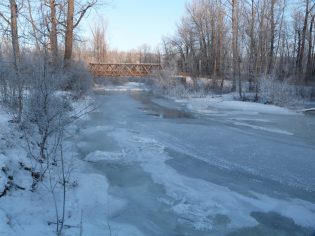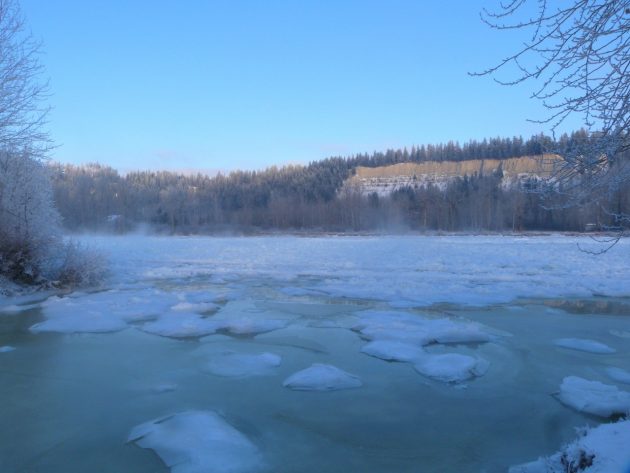Nechako River Continues to Jam Up
Prince George, B.C.- With the continued cold temperatures, the ice continues to build up on the Nechako River.
City Manager of Public Works, Dave Dyer says the ice build up at the confluence this morning is three to 4 feet higher than it was yesterday. “Yesterday the channel, you could see, was flowing right by the canoe launch, Now that’s all ice so there is a significant amount of ice built up.”

The flow at the gauge at Isle Pierre is just under 200 cubic metres per second, “It’s kind of at the threshold where we get a potential of threat for flooding. Anything over 200 cubic metres and cold weather starts to generate a significant amount of frazzle ice and with that much flow, it can be a threat.” Normally, at this time of year, the flow rate is about 100 cubic metres per second.
“At 200 (cm/s) there is a potential threat for flooding, but again, it depends on how long the ice has a chance to build up” says Dyer. The long the cold temps stay , the frazzle ice continues to build and to compress against the ice at the confluence.
City crews are monitoring the situation and Dyer says at this point, there is no threat to properties along the banks of the Nechako, such as the residences and the Northern Lights Estate Winery. “There is still a fair bit of free board from the top of the water to the bank, so that’s what we’re watching.” Dyer believes the current high flows are a result of “unprecedented rainfall in October and November.”
Rio-Tinto Alcan’s release at the Skinslake Spillway has been typical for this time of year, with discharge averaging around 31 cubic metres per second since September.
At this time, trails in Cottonwood Island park are still passable, but Dyer says should the water spill over into the park the City will take the necessary measures which would mean closure.


Comments
If the Nechako floods again ,all of the blame should fall on Dave Dyer and all of the river experts at City Hall. City Staff were told about the solution but have not acted on it. DREDGE THE RIVER. Hot water, Dikes and Ice Breakers are only a feeble attempt to solve an obvious problem. When your bathtub overflows you don’t build higher sides on it, you remove the plug. Silt has been accumulating at the river confluence for years. This is the plug. REMOVE IT. The extracted gravel also has a value. Common sense is obviously not in the vocabulary of Dave Dyer and crew.
city of PG hasn’t has much common sense for years! and it only seems to get worse as time goes on.
And we are to assume that you have such common sense. LOL.
I do not even want to ask how you can assure us that you have more common sense than the engineering community around the world who specialize in trying to solve the problem of fighting natural forces involved with the various causes of ice jams.
But go ahead, try. ;-)
Find me an article somewhere that has had repeated success with dredging a river bed to prevent ice jams. Make sure you compare river water flow volume, formation of ice fractals water temperatures, air temperatures, etc. data collected over say 5 or more decades.
Read a bit more as Dyer and company likely have done and you will learn that there is a difference between a bathtub, it drain, and ice floes forming upstream in a river, flowing down river and jamming when the obstruction of a T intersection and the flow of the more powerful flow of the Faser causes the obstruction.
There are many methods which have been tried in many parts of the world, especially eastern Canada as well as the northern USA. For these methods, there are many research papers available to the engineering community as well as the public. Some cost money to join an organization and others can be purchased individually.
Do yourself a favour and study a little bit more and forget trying to apply Archimedes’ tub experiences to fast flowing northern rivers.
It is an insult to those who are trying to battle mother nature by capturing the experience of the engineering communities from similar geographic and climatic regions who have the same challenges with ice jams.
One example of an approach that has worked. DO not assume, however, that the same approach is appropriate for PG!!
nrcresearchpress.com/doi/pdf/10.1139/l90-081
they have had at least 10 years to fix this but hockey arenas and other such stuff have been more important.
At least the winery won’t have to worry about this, as they have a political connection to see they reimbursed if they have any loss due to the ice.
I would like to see them try to get to the front of the line.
They were the most recent to build in a questionable spot. As a result they, and any engineers they had looking at it for them, have had the latest information.
It would be interesting to know whether they were able to get flood insurance. Also whether they had to sign a waiver with the City to save the City harmless.
Seems people have trouble making a connection between building the Kenney dam and diverting 30% of the Nechako River flow through Kemano One tunnel to the Pacific ocean. The loss of this 30% resulted in a lot less flooding in the Prince George area because of the reduced water flow.
However, the loss of the original flow also caused severe silting over the years, and this silting has forced the river channel to the North side, and as a result it now runs head on into the Fraser, and when there is ice the jam begins to build. The jam also starts to build on the South side because the ice and water cannot get over or around the silt and immediately starts to back up. We can see that this time around some of the water is running through the South side channel behind the rail museum and into the Fraser.
So clearly the cause of the flooding (for the most part) is the silting over the years, and the relocation of the natural flow of the river. Dredging on the South side from the Cameron ST., Bridge to the CN Rail bridge, and dredging under the CN Rail bridge would solve this problem.
There was a time when they did in fact removed some gravel on a regular basis on the South West side of the Nechako/Fraser river.
In any event this is not a huge problem that has to be solved by the great minds of North America and Europe. It is simply a silting problem, than can be solved by dredging.
It would also help if Rio Tinto did not release any water in the Nechako when we are having an icing problem.
Have a nice day.
I have noticed over the years that sometimes good old fashioned logic and common sense often override science and technical studies. In my humble opinion this is such a case. DREDGE THE F$@K%*G RIVER!!!!
Comments for this article are closed.